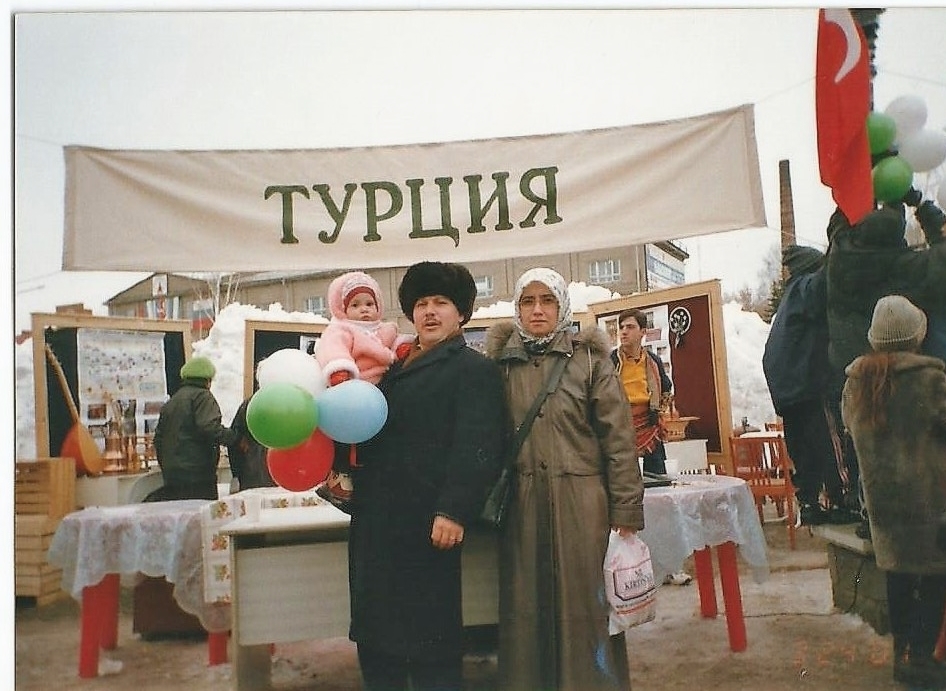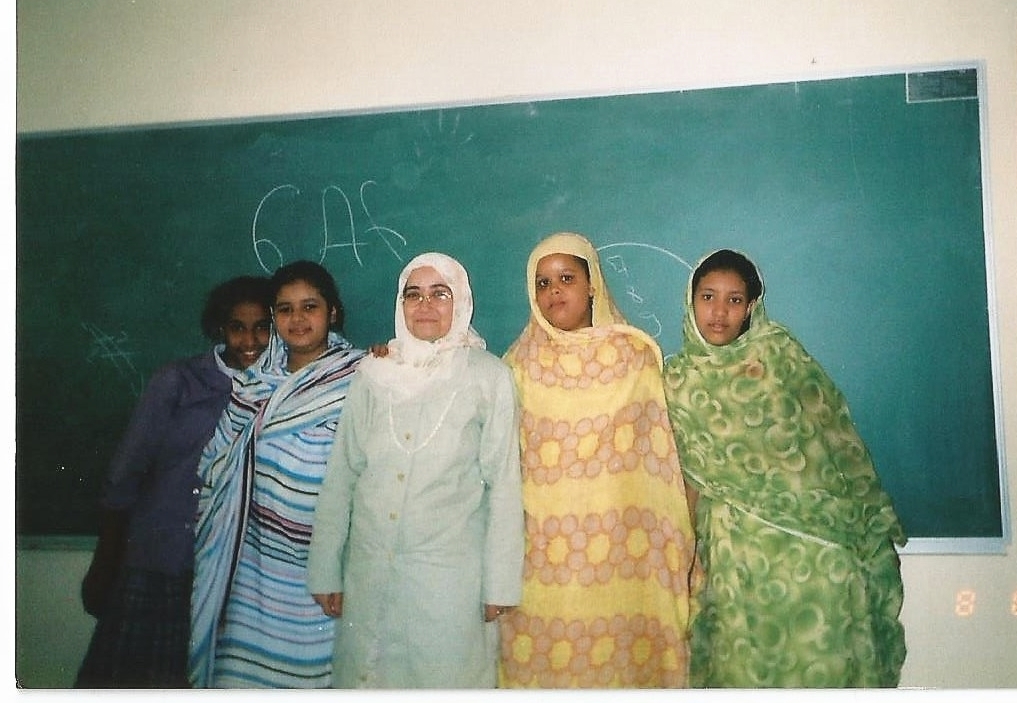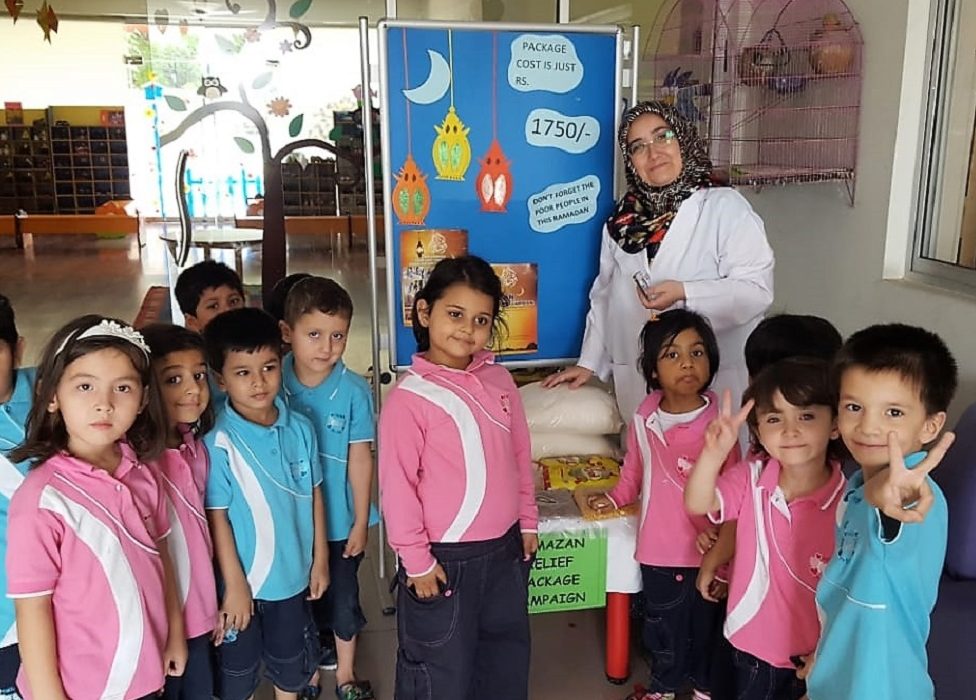Educationist Fatma Esra Tosun’s journey leading from İzmir to Siberia and Africa to Pakistan (1)

Days of ‘scarcity’ and opening of a school in Islampura
January 29, 2022
We look forward to receiving your memories on food
February 2, 2022Fatma Esra Tosun worked as an administrator and teacher in several branches of the PakTurk Schools during her 13-year tenure and life in Pakistan. Except for the ‘obligatory’ unemployment period before leaving the country in 2018, she was involved in intense training activities for years. However, her life before she went to Pakistan was also full of struggles. Let’s give a little hint by saying, “Each child of Teacher Fatma, a mother of 3 children, was born in a different country”. We need to revisit Izmir of the ‘90s to get to know her as an educationist, to understand her intentions that led her to Pakistan and her motivation for bravely facing all of hardships and risks there.
Fatma Esra and Emine Emrah: Two sisters who lost their mothers while young and grew up cared by their retired military pilot father… The first meeting of these orphans with their Hizmet-inspired ‘sisters’, the father’s efforts to raise the girls well, Fatma Esra’s years at school, marriage and her first trip abroad as an educationist… Her life story also sheds light on the experiences of the pioneer female educationists who volunteered to teach abroad inspired by the Hizmet Movement. This is why we asked her to briefly tell us about her schooling and the countries where she worked before Pakistan.
-Can you tell us a little about your life before you went to Pakistan?
I am from Izmir. We lost our mother when I was 11 and my sister was 10. It was when I started grade 6. My father was a retired military pilot. After grade 8, I qualified to be placed in the Gülhane Military Medical Academy (GATA) Department of Nursing with full scholarship. I also qualified to study in İzmir Güzelbahçe Anatolian High School in another exam I had taken in the same year. My third option was to study at the Çifteminare Qur’anic School for Girls, which was close to our house. This school is now known as the Raif Cilasun Qur’anic School for Girls. It used to be the girls’ section of the renowned Kestanepazarı Qur’anic School back then. Late Raif Cilasun had not passed away then. He had started an Arabic section in that school. In the school, Arabic was taught alongside the hifz (total memorization of the Holy Qur’an) education. They used to admit students through a merit examination. I also passed the exam of that school.
-The other schools were also high quality and demanded by many. Why did you study in the Qur’anic School?
I don’t know, should I say it was a ‘divine incentive’? My father wanted me to study at the GATA because he was from the military. I actually wanted to study medicine and become a doctor. I could have elevated from nursing to medicine. My father encouraged that too, but in the end, he said, “I leave it up to you. Choose one of the three options yourself.” My father remarried a year after my mother’s demise. So, I had a stepmother. Actually, the Qur’anic school was close to home, but I don’t know why I made that decision. It must be due to the spiritual atmosphere of the place or maybe I was moved by Uncle Raif’s speeches. Uncle Raif knew my mother too. My mother had been a teacher at the Qur’anic school, but she did not continue after she got married.
Eventually, I studied at the Qur’anic school. I passed the entrance exam with flying colours. They told my father they wished to train me for hifz, but I feared the hifz teachers; they were strict. “Let me not go for hifz, Dad,” I said, “I want Arabic.” We attended the school for 8 hours daily. In the first 5 hours we took speaking classes and in the remaining 3 hours we translated from Arabic in hadith, fiqh and tafsir. It continued like this for 2 years. Back then, I wished to complete the Imam-Hatip High School courses and graduate externally. I prepared for the exams and passed 50 out of 56 exams. They also granted me exemption from the remaining courses. That was how I also graduated from the high school. That year, I had taken the Open University exams. I qualified to be placed in a social sciences degree program. Meanwhile, I was staying in a student apartment with my Hizmet-inspired friends and tutoring junior students of the Imam Hatip High School who lived in the dormitory. I was also giving homework help and tuitions to foreign students studying in the Malhun Hatun College.
-Apparently, you voluntarily started your educational activities long before you became a teacher. How did this happen?
My father is an adherent of the Risale-i Nur Community. He met with Ustad Bediuzzaman Said Nursi. Every chance he got, he would tell people about Allah and the essences of faith. Even during a 15- or 20-minute city bus journey in Izmir, he would find someone, start a chat and would not even wish to get off the bus if he had something more to tell. No matter who sat next to him, he would chat about Ustad Bediuzzaman and Risale-i Nur Collection. When my mother passed away, he worried about our future. “How will these children grow up? What will happen to them?” he kept on saying to himself. One day, he told a young lady, who was sitting next to him on the city bus, about us. She was a Hizmet-inspired sister named Nesibe, who studied Economics at the Dokuz Eylül University. “I have two daughters; I don’t know to whom I should entrust them,” complained my father. Sister Nesibe took my father’s address and said, “Let me and some friends visit you to talk to your daughters.” We knew nothing about this conversation. My father did not mention it.

TURNS OUT OUR SOULS SATED WHEN WE ATE SOME ‘FOOD BY MOM’
One day the doorbell rang. My sister and I were surprised to see some ‘sisters’ at the door. We were surprised because no one had visited our house since my mother’s demise. Since my father was a widower, neighbours did not visit when there was no lady of the house. We met sister Nesibe and her friends. They said, “We have come to pick you up!” My father was so happy to see them. He sent us with them. From that day onward, we accompanied our Hizmet-inspired sisters wherever they went. On the first day, they had taken us to a sermon. I never forget, the preacher wept profusely while he talked about the tribulations of the Muslims in Azerbaijan.
-It shows that atmosphere moved you a lot…
I understood nothing the preacher was saying. Since the congregation in the mosque was weeping, I wept too. A venerated scholar weeping for his brothers and sisters in Islam oppressed in another country… These moved me a lot. While some people didn’t even cry for their own siblings, we were crying there for people we didn’t even know. I am grateful to those sisters; they never left us to ourselves from the on. They took us to reading programs and events. They would simply visit our home and say to my father, “Uncle, we are taking the girls with us.” We also frequented the Risale-i Nur talks delivered by prominent devotees of the Risale-i Nur Community such as Aunt Sema and Sister Aynur, yet we were green behind ears. We could understand nothing from the discussions held. We recited the Holy Qur’an and the Jawshan al-Kabir, and listen to the conversations. Sometimes we fell asleep when we were tired. Our key motivation for attending those discussions was simply this: We missed our mother’s food and we looked forward to taste the food cooked by the sisters hosting the conversations. The older sisters knew our condition. They showed us special understanding (saying these in tears) because we were orphans. May Allah bless those sisters and aunts. They supported us. I can never forget the blessings of the Qur’an and the Jawshan al-Kabir recited in those conversations. We may have eaten two morsels of ‘food by Mom’ there, but our souls were also profoundly satisfied. We could not understand this then, but as the years passed, we realized the effects.
-How did you continue your education?
Although the Qur’anic school was close to home, I preferred to stay in the dormitory because I had a stepmother at home. The life in dormitory was different. Back then, we used to teach younger children the recitation of the Holy Qur’an and religious knowledge in the mosque. We had a great time at the Qur’anic school. Those older sisters set an example for us. Shortly later, we guided others. When I succeeded in the exams and received my high school diploma, I took the university placement exams and studied Social Sciences at the Anadolu University Faculty of Open Education. At the same time, I attended the 1-year Preschool and Primary School Teaching associate degree program offered by the Dokuz Eylül University and got a diploma from there. Had I stayed in Turkey, I would have been appointed as a primary school teacher to somewhere. That was when I met my husband. After I got married, I accompanied him to Bashkortostan, an autonomous region in the Russian Federation where he had been working back then.
-How was your marriage? Can you tell a little bit about your spouse?
My husband Nebi graduated from Al Azhar University in Egypt and was an Arabic lecturer at the Bashkortostan State University. We met in 1997 through an elder who knew us both. We decided to get married, but my father would not consent for sending me abroad; he would even not consent for sending me away from Izmir! No one in my circle knew a country called Bashkortostan existed. What’s more, when we visited the civil registry office in Izmir to register our first child born in Bashkortostan, we said to the officers, “His birthplace is Bashkortostan” and nobody had heard such a place. “Do you mean Kurdistan or what?” the officers would ask again and again. They said “Show us its location on the map,” but the region did not even have a place on the map. We tried to prove our point by showing them photos.
-How did your father consent to your marriage?
The day my husband’s family arrived to ask my hand; my father got infatuated with my husband. 😊 He had seen him for the first time. He could not speak. He just kept saying about Bashkortostan, “It’s too far away.” He thought I didn’t know where Nebi had been working. “Where is he from, Dad?” I asked him. “He’s from Russia,” he replied. “Russia’s not that far,” I said. Since my father was from the military, my former suitors had always been from the armed forces. One day, I had said clearly to my father, “It’s enough I have remained under the command of the military, I do not wish to marry a soldier!”

“OH MY, WHERE DID I GIVE AWAY MY DAUGHTER IN MARRIAGE?’
Soon, my father wished to meet Nebi’s family. They lived in a village on the Madran mountain in Aydın province. I had never been to a village in my life. My father liked my in-laws. Soon, my father and father-in-law became like brothers. They loved each other so much. My father always had a concern about my sister and me. Since we had lost our mother at a young age, he wanted us to have a mother-in-law who would understand us and act as a mother. In this sense, he loved and approved my husband’s family so much. They were a large family. My husband is the oldest of 7 siblings. Although I was younger than some, they adopted me as their big sister. They were very respectful. On the way to my in-laws’ village for the first time, my father kept on looking around and said, “O Allah! Where did I give away my daughter in marriage?” The cordiality and sincerity of my husband’s family and the way they welcomed me made him forget all his worries. An educated bride, a soldier’s daughter, arriving from Izmir, etc… these were significant. I loved them too. Even though I had a little trouble understanding their dialect… I could not understand the conversations at first when we sat together as a family. Even if I could not understand, I used to laugh whenever they laughed. My father-in-law used to explain their conversations.
–You experienced significant turning points in human life, such as marriage and going abroad, in a short time. How did you feel when you went abroad?
We got engaged in 1997. My husband wished to get married and take me along within a short time that year, but my father did not agree. He wanted all ceremonies such as engagement and wedding to be conducted according to traditions. I was also in my first year at the Open University. In that year, I also completed the degree program I received from the Dokuz Eylül University. We got married in 1998 and set off two weeks after the wedding. It was the first time I left my family and country. As I was leaving Istanbul, I looked back and said to myself, “You are on your own now. You are to do everything yourself, for better or worse, learn to stand on your own feet!”
When we arrived in Bashkortostan, Nebi continued to teach at the university. Meanwhile, we wished to follow further studies at the university. We passed the particular exam. We started as students at the state university there. I was the first and only Turkish female student at that university. I studied philology, that is, English, Russian and Turkic languages. I also learned languages such as Bashkir, Tatar and Kyrgyz. Russian is hard to learn. It was there I realized I had penchant for learning languages. I knew a little English. I had no idea about Russian.
I have 3 children. My first daughter Nebil Nevin (Nevin is my late mother’s name) was born in Bashkortostan; my sons were born in Mauritania and Pakistan respectively.
-Which other countries had you been to before you went to Pakistan?
After living in Bashkortostan for 5 years, we moved to Senegal, a West African country. I did not work in any school there, because the medium of instruction was French. I taught English to students at home. Since I could not speak French, I faced hardships there. We did not stay there longer, though. A year later, we moved to Mauritania. It was the first time a Turkish school would be opened in that country. My husband and I were appointed there because both of us knew Arabic. I taught Arabic and English to secondary and high school students. My son Mehmet Selim was born there. Our son was described as “the first Turkish baby born in Mauritania” in the Ayna (Mirror) globetrotting show on Samanyolu TV back then. My son was 3 months old and my family in Turkey saw him for the first time on TV! Back then, girls were not allowed to have education in Mauritania. There were almost no suitable hospitals, female doctors or health workers there. Our school was the first institution to admit female students. We stayed in Mauritania for 2 years. We moved to Pakistan in September 2005 when my son was 9 months and my daughter was 6.
To be continued…





No Comment.